George Rouskas
Studying the literary and artistic work of Georgios Rouskas, you can see a very sensitive person with a great spiritual background, culture, depth of thought, and honest motivation. Features that one encounters only in important creators.
In his literary work, his ability to "shape speech" is distinguished, creating a special way of writing.
His speech sometimes prompts the reader to anticipate the revelation of the unspoken and the unseen and sometimes takes the reader on a sensitive and vulnerable journey into a floating world of delicate and almost fragile emotional balances.Lambros Mitropoulos
George Rouskas is undoubtedly a versatile personality, being a civil engineer, poet, visual artist and literary critic. He graduated from the Varvakeios Model School and then studied Civil Engineering at the National Technical University of Athens. His literary talent is also evident. His bibliography includes seven poetry collections, two books of critical literature, a theatrical play, as well as participation in collective works of poetry and literature. His artistic activities include two personal exhibitions of painting and one personal exhibition of ceramics and pottery. In addition, Rouskas has published poems, essays, short stories, articles and literary criticism in literary journals, both on paper and electronic. Many of his poems have been translated into English, French, Spanish and German. He is also a member of the National Society of the Greek Authors. The kindness and ethos that distinguish him are evident in his poems.
Giota Eftaxia: Mr. Rouskas, it is a great honor and pleasure for the Radio Art and me to have this interview with you. I would like to thank you from the bottom of my heart!
George Rouskas: I thank you too for this chance for greater communication as well as for your contribution to people through Art.
G.E: Apart from being a civil engineer, you are also a poet, visual artist and literary critic. What has led you to such variant creativity? Is it a matter of offering, self-consciousness or self-realization?
G.R: The desire and passion to create doesn’t end at structural engineering and buildings’ construction. Perhaps it is my inner needs (subterranean οr torrential), that direct me which only Art can seek. Perhaps it is salvation from ubiquitous rationality. It may also be the other side of mathematics, physics, analytical thinking that find its resource in several paths of different kinds. The impulse comes from my need to express myself, to know myself, to dare to find and touch the aspects within me without even being sure of their existence or of the result. Art, as a view of ourselves, of the creator himself and his position in the perceived-social-interpersonal universe, or as a view of the visible (to him alone), represents a different view of the world. Therefore, it inputs to some extent and it contributes to self-knowledge and self-realization, without even aiming at it.
G.E: You have studied various poets’ poetry. I was impressed by your critical approach to the poetry book ''Epitaph Road'' by Kostas Th. Rizakis. Would you like to tell us something about this approach? How is your own thread of life lit?
G.R: The critical apprοach to ''Epitaph Road'' happened the way it happens when you listen to the funeral bells of Good Friday. You are stripped of everything cosmic. You put on what is absolutely necessary by putting aside sophistication. You hold your candle in your hand and walk slowly to the shrines of pain, loneliness, injustice, cruelty, violence and death. The hymns with the beauty of their language and Byzantine music sustain you, whilst nature’s sweet fragrances lift the sheets of memory and awaken expectations in you. My wick of life is lit by the spark of words. My wick glows with stellar sparks of love. These sparks lit my wick again and again when cold breathes or tears threaten to extinguish it. Love hides beneath its ashes. But what hides in its embrace? Words.
G.E: In 2017 you wrote an essay on our great poet George Georgousis. What made you plunge into his own elaborate rivers? (Paraphrasing the title of your essay in a way).
G.R: It was back to 2016 when I visited him to wish him Happy Easter. Before I left his home, he gave me laughingly his book ''The Rivers''. After having got on the metro, I started reading it. It touched me so much that I forgot to get off the train before reaching at the terminal. It took me many months studying the odyssey of their travels, the place and time of their stops, the clarity, the breadth and the depth, struggling not to get drown in the rush of verbal waters. I believe this book is one of the most important books of Greek poetry. Poetry, when it touches you deeply, turns reading into experience. Sometimes it blesses the experience with the spirit of enlightenment, as in baptism: you come out of the baptismal font enlightened. Georgousis was a great poet. He used to write mainly at night (''Nyktourgos*'': A word we find in the writings of the Greek philosopher Plutarch. It was Georgousis’ favourite word). This word inspired me to write the title of the book ''Night Ceremony of Immersion'' in ''The Rivers'' by George Georgousis (2017). This book is a baptism into the aquatic beauty of poetry.
Nyktourgos: word combined of two ancient greek words, Nyx (night) and Ergo (work)
G.E: You have also got involved with the Japanese poetic form ''Haiku'' (''Haiku Threads'' (2017)). What prompted you to delve into this very special poetic form and give us these beautiful Haiku?
G.R: I‘d prefer reading you about my involvement with Haiku from the book: ''As the smallest verbal integral part of the whole, the haiku can represent itself, even by itself, wherever it appears. It is the smallest complete, fully integrated reference to the universe. If a human hand succeeds in extracting it, it is transformed into a messenger miniature of the Whole, like the Winged Victory of Samothrace in the Louvre. /.../
First poetic challenge? The economy of language, which is very familiar to us through the ancient quotation: ''Brevity is the soul of wit''(to lakonizein esti philosophein). Precision, the courage of nakedness, self-efficacy, semantic integration, direct contact with affect, associative harmony, verbal incarnation, the other side of experience and the endowment with the dynamic of the unconscious-automatic transition to the Whole, starting from the individual (whatever this means for each individual). All this coexists. For the poet, what he stands for is the search for absolute freedom within the absolute limitation of words and syllables''.
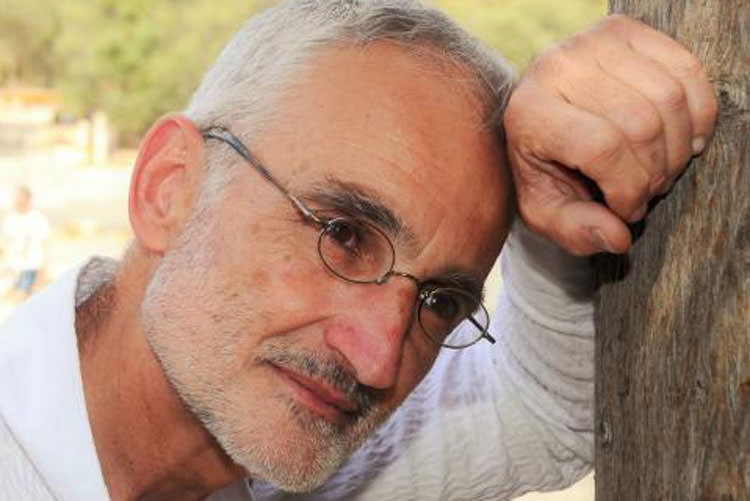
G.E: In your poetry collection ''As another Talos'', which deeply moved me, you describe life itself, the existential problems that people face and the bitter death. Would you like to tell us something about this poetic work?
G.R: According to Greek mythology, Talos, the first ancient robot, protects Crete from its enemies’ attacks:«Ούτος ο Τάλως τρις εκάστης ημέρας την νήσον περιτροχάζων ετήρει», (Talos himself guarded Crete’s coasts three times per day) according to Apollodorus, the Athenian grammarian. On the island there was life, culture and art, just like nowadays. If we take the whole earth as one big inhabited island- which has already happened with globalization - various questions are raised through existential reflection and philosophical thought. The book discusses these questions in a poetic way having fully awareness of the parameter of time and its finiteness for human life. With the quantum knowledge that there is no place without time and no time without place, the following questions arise in the space-time field of human life. Who will protect language as another Talos? Who will protect our heritage? Who will preserve dignity? Who will protect our right to the goods in life, to joy, to well-being as well as to life itself? Who will protect our privacy, our personal data, our freedom? Who will protect our relationships and our existing or expected relationship? Who is the Talos of life? Who is the Talos of death? Who will ultimately protect us, if not the Talos we hide within ourselves? How will we find him? How can we activate him? What’s Poetry’s role in all these?
G.E: The poet draws life from poetry, but poetry is also an ode to the greatness of life. What does poetry mean to you and what role does the poet play in the difficult days we are going through?
G.R: I am going to change the word ''mean'', because to me poetry happens. I know hundreds of views and attempts to define poetry (because poetry has the privilege of not being able to be defined, because every time we define something, we limit it. Art doesn't exist within limitations. I would dare to say that the term poetry best suits to the word ''orgasm''. I can explain it to you with a few lyrics which I made up right now:
Words’ orgasm
Poetry’s substance
The poet’s role in our difficult days we are going through is to stay out of the defined distributed role-playing by the ''Great Director''. He must dare to refuse any role and remain in the core. He must stand as a human being in today's (unfortunately constantly repeated) dystopia and honestly devote himself to the essence of his Art. In similar circumstances, our ancestors have shown us the way. Odysseas Elytis also mentioned this in his work ''Open Papers''. Art leads you where you are supposed to go. If you try to guide it yourself, the destination will not be equal to it.
G.E: Through poetry can someone conquer bliss to live in harmony with his demons? What does bliss mean to you? Is it different from happiness?
G.R: Through Poetry, whether as a creator or an active reader, you can calm some of the waves of the raging storm within you, or at least recognize them as your own and live in harmony with them. Bliss, beyond the Aristotelian philosophical definition, I feel is the pinnacle of happiness. I have encountered happiness in moments. When I learned of my acceptance to Varvakeios Model School, when I received my diploma, when my children were born, when I held the first copy of my book in my hands, when I gave poetry seminars to high school students, when I discovered great-in my opinion- poems by newcomers or unknown poets, when I saw my ceramic work in its final form which surpassed my imagination.
Happiness met me in the museums, in the theatrical plays, in music, in galleries, in travels, in contact with nature, but also when I tasted a kiss with my eyes closed, when I got a warm hug, a warm and firm handshake, when...
I feel it now when I manage to sleep peacefully at night, when I see clouds playing with the morning sun, when I spend time for myself, when I turn off my cell phone, when I am a reason for my neighbor to be happy, when...
The older I get, the more I realize that happiness can be life itself, along with pain, sorrow, loss and unhappiness.
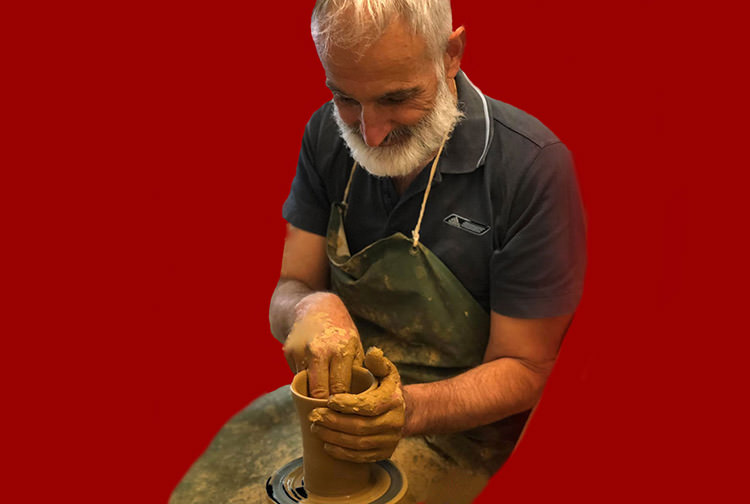
G.E: Apart from poetry, you have also got involved with pottery, which is called the '' art of the earth'' and painting, too. Could we say that pottery, poetry, science and art in general uplift humanity’s spirit?
G.R: Pottery, poetry, science and art in general uplift the human spirit from earth to heaven. Therefore, they direct humanity to look from the lowest to the highest point, which leads to evolution. Because heights are the new pure places suitable for creation and meditation. The lower places are uplifted and become equal, upgraded places, as all places are connected to each other. They are integral parts of the existence’s foundation.
Painting emerged out of me in itself. It almost commanded me to grab the brush without any former studies or practice. Good circumstances gave me the chance to exhibit twice acrylic and oil paintings on canvas, wood and glass.
Ceramics, poetry and painting found me (Titos Patrikios believes that ''poetry finds you''). He knew my passion for handmade creations much better than I did, as well as my special connection to land, just like my name George (George< ''Gewrgos=farmer''). Pottery and ceramics in general are the tangible aspect of Poetry to me. Earthy words in the kiln of lyrics. Words in the silent land created in a poem in the form of a pot. Both handmade. Only the material of incarnation is different. The intagible primal spark? Common.
G.E: What‘s your driving force for the wonderful poems you write and your artistic work?
G.R: The need to express myself, to let what’s grown so much in me come out without knowing it, without communicating it. It is something that has been given to me in the past and suddenly it eagers to come out out. If that need isn't accomplished, I feel just like my life is going to be detached.
G.E: In the presentation of Angeliki Giannopoulou's book ''Words in the Light'', you had mentioned that ''human wants to love, desires something and expects something''. What do you expect?
G.R: That is a sentence from my favourite book ''Words in the Light''. It refers to the title of Leo Buscaglia's book ''To live, to love and to learn'.
What do I expect? Το face the sun with freedom and love. To remain human by smoothing my darker edges more and more. We all need to free ourselves from the dark side of our ego. We need to enlighten the gap in our soul and we need to focus on love. I eager for a civilization where the Babel’s language will have become a universal, without words, language love, embodied in the eye, in intention, in kindness, in embrace. If love prevails, it will lead us to a place of peace, reconciliation and beauty. Only love can lead to harmony between our earthly and divine nature. Right to joy, to beauty, to art. Dreams? Perhaps...
Every day, when I realize I΄m on my feet and have the opportunity to open my window or the door, I am grateful for the great blessing of living, of dreaming, of expecting, no matter how much I suffer, no matter how many obstacles I’m facing.
''Man is the dream of a shadow''-Pindar
G.E: Do you think it is possible to equate a life that derives from ''having'' with a life that derives from ''being''? Does ''having'' take precedence over ''being'' these days?
G.R: ''Having'' with measure. '' Measure (is) the best'' (metron ariston), according to the ancient Greek quote. In this case, ''having'' can help the evolutionary course of ''being'' and give it the impetus to move forward. When ''having'' defines ''being'', it becomes a trap, invisible at first, but intentionally hidden in the future. On a personal level, this is convenient, because the value of ''having'' presupposes less pain and effort. It is also true on a social level, because dealing with people who are focused on material is much easier and more effective than dealing with people who have well-structured personalities (let's look at modern life models).
To free someone from the trap of excessive ''having'' requires willingness, knowledge, measure, self-knowledge, art, love. Nowadays the acquisition of things has been greatly inflated against the individual. Unfortunately, the tendency to ''have'' also exists in personal relationships and leads to the perception that the one who has the power, has also the right to consider other people as his ''property'', whether it is a friend, a partner or a husband/wife. There is a wonderful Greek world that proves how harmony can be achieved in love and friendship. It is the great Greek word ''Αλληλοπεριχώρηση''. It means the coexistence of two or more people (or opinions) without losing their uniqueness.
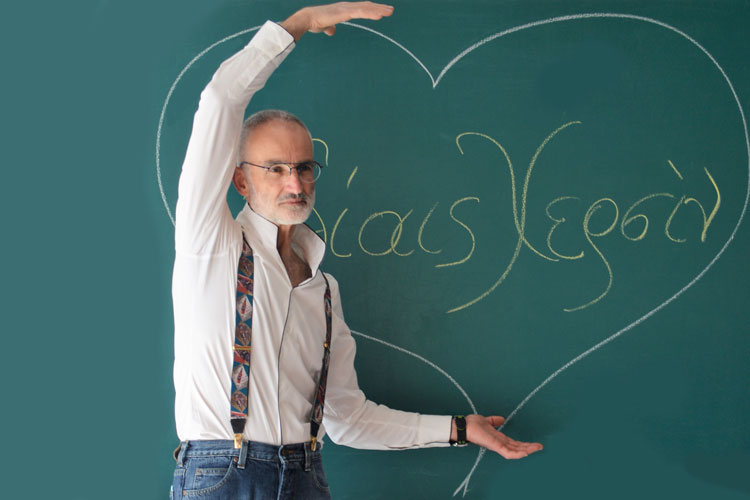
G.E: Is poetry and art a tool to get in touch with the human being, the world, the universe? Do you think art helps us understand the world better?
G.R: Poetry often becomes –in an inexplicable way- a means to get in touch with the inner self, to connect with the subconscious, to sense who I might be. It is a need to release inner energy in the form of a volcanic eruption that happens in an unsuspected moment. I might not have thought it would happen I hadn't seen the petrified lava of words on a paper.
Through this involuntary process, invisible bridges of communication are built with other people, as well as with unknown parts of myself. Therefore, Poetry and Art bring people closer by bringing their common aspects to the fore.
Art shows us that we are not alone. Pain, madness, fears and death are common to all people. Art opens windows that reveal unseen beauty. It helps us to endure the world.
G.E: Given the fact that poetry is not everyone's cup of tea (fortunately or unfortunately), have you given any thought to the expansiveness and the kind of audience that will read your poems and attend your work’s presentations?
G.R: If just one reader comes closer to a poem and finds out in it a hand to hold, a refuge, a reason to change his mind, to move, to see that he is not alone in pain, in loneliness, in misery, in death, just like the poet himself is, then the poem worth it to have been written even for a single reader. The aim is for a person to find a new will to live through a poem and that has really happened. However, even poems that will never been read, still worth it because while they were being written, the poet went through his pain, just like a woman giving birth to a newborn child. We‘d almost had lost hundreds of poems from the great 19th century American poet Emily Dickinson, if her sister hadn't accidentally discovered them after Dickinson's death. Fortunately, she decided to publish them. Till then, almost no one had read them. Wasn't it a matter of importance to Emily herself that her poems existed, though she had decided not to share them with the public while she was still alive?
And as far as it concerns me? I do not write for myself, I do not write for anyone else. I write when something inside me, stronger than anything else, pushes me to isolate myself and enter into a process of writing. No one can tell how this happens and it doesn't matter. Why should everything be explained logically?
Certainly I am very happy when my poems are published, but happiness during creation and satisfaction of the writing result overcomes everything.
G.E: Antoine de Saint-Exupéry had said '' What gives meaning to life gives meaning to death''. What gives meaning to life, as far as it concerns you?
G.R: What gives meaning to life is the absence of meaning, that is the absence of the power of reason, the removal of the dominion of reason and the mastery of all the senses, not just the five senses, but also the rest of it, the embrace, the empathy, the intuition. It is the blessing of living each day discovering the greatness of life in everything that comes into contact with you, like a raindrop landing on your hair from a great height, reminding you that you, just like that raindrop, are part of space-time. In my poetic work ''Pentagram Moon'' I assert that '' the whole beauty of life exists in the beauty of the minimum”. Beauty is interwoven with Love. The driving force of life is Love such as is a Love of Art, of the gift of life, of communication. When you live in the present, you realize that love is very important for life.
G.E: If we knew when we were going to die, would we have the desire to live and create? Would we become more human in that case?
G.R: Maybe we would become more and more selfish, vain and inconsiderate in order to get as much as we can, as much pleasure and enjoyment as we can, being indifferent for others. Even if we aim to create, to leave something behind, we will not make it, because the result would be under the pressure of time, thus not authentic. Freedom is the condition for real art. If you know when you are going to die, how can you be free, when there are time limits, dreams and horizons? In that case you can only create something if you manage to go beyond it, and achieve a different kind of freedom. But that requires a lot of work with yourself. On the other hand, you can use the given and announced duration of your life to make you more human. It can help you live with your senses. It can help you surrender yourself to nature, love, friendship, joy. Which path you choose, has to do with what you choose to be.
G.E: Do you think that poetry and art in general are a form of immortality?
G.R: Definitely yes. The artist passes away, but some poems or works of art are left behind forever and become immortal. The term ''immortality'' is relevant, because it only exists when there is human life on the planet. It only makes sense within the coordinates of human time. Art can conquer immortality if it is made of intangible elements that can co-move the senses in the human unconscious or rekindle the sparks of the unconscious thought.
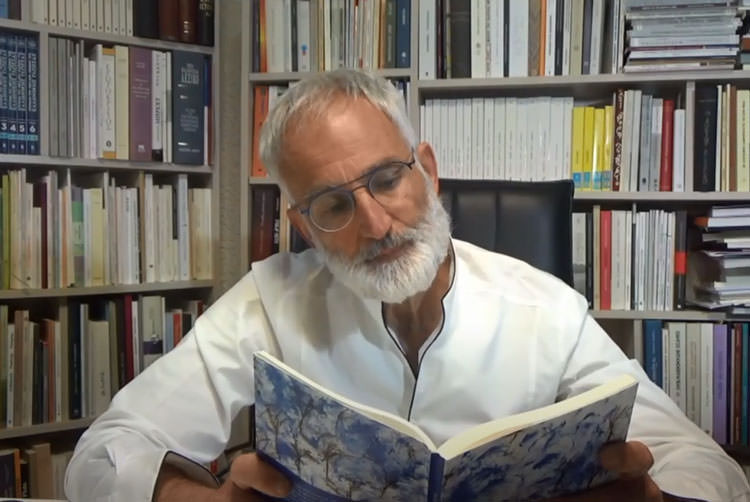
G.E: In the description of the collective work ''In the Beginning is the End'' (2020), which you took part in, is mentioned the following quote: ''Life begins with darkness and ends with light''. Can death be light? Does the death of existence eventually transcend the end of life?
G.R: Life begins from the darkness of the uterus. It often ends with some light, with the daylight or the moonlight, with the artificial fluorescent lamp in the hospital or with the yellow dim light of the lamp in a nursing home, with some other last minute’s light, with the candle in the cemetery, with the transitional light. It clearly ends with the experience of light, with flashes of memory with as much light as the eyes could take in, with as much as they drank, with the light they ended up burning. After every light’s end, even the darkened one, there is a return to the darkness of the earth’s uterus and from there a new cycle of light can begin through the memory of what has been left behind, but also through the light of the deceased's deeds. The cycle of light of life ends with death. The poet George Douatzis claims that the light goes out with the light:
''Did you think that on a moonlit night, the lights of the moon and stars go out as the sun rises? Did you think that the light goes out with the light?
The light of life goes out with the light of death. The light of death goes out with the light of a new life. Life means energy. Light means energy, so life is light. Death means movement, energy transformation. Light is energy. Death is another form of light.
The poet George Georgousis had conceived it alive. I remember his lyrics:
''για να χωρέσει ο ίσκιος σου / θα πρέπει να ’χεις πολύ ξαγρυπνήσει / στου θανάτου σου το φως''. (So as your shadow fits / you must stay much awake / in your death’s light).
Death describes you in accordance with the light that you deserve. In that sense, death is also light. For the Christians, it is the expected light of resurrection. For those who believe in reincarnation, this light is the light of the next life. For atheists or agnostics, is the uniting with the light of the universe.
The existence’s death if it is beyond the end of life? As if we are asking: Philosophy or Art? Is that a matter of definition or preference? Sometimes yes, sometimes no. Death has no rules. Death makes up its own.
G.E: Which of your professional qualities fascinates you the most and why? Do you think your artistic qualities complete you as a human being? Is there any quality that you would like to dive into more in the future?
G.R: Everything I do. I don’t feel comfortable with the term ''qualities''. Maybe Robert Musil's book ''The Man without Qualities'' has influenced me. Everything I do determine me at all times. What little more epitomizes me is Poetry, because I need poetry as much as my breath. I can't exist without it. The love of words is probably the greatest in my life. However, my hands can't exist without pottery either. I realize this because when I am at the potter's wheel, I’m not thinking about time, just like when I write. Only love can abolish time, love for a person and for Art, too. In the body’s orgasm, poetry’s or pottery’s, there is no time. Death cannot overcome time, but Love can. When I have the time, I dream of devoting myself to writing and pottery. At the moment, I face everyday the brutality of our so-called culture, in public services, in bureaucracy, in pluralism, in pharisaism, in the imbalance of attitudes...
G.E: Many of your poems have moved us deeply, such as from your poetry collection ''As Another Talos'': ''Flood'', ''May’s Night'', ''The Dress'', ''You Will Be Out For Me''. We would like to accompany these and other poems of yours that have deeply moved us, with music and recitations of our own, to be included in Radio Art's Music Poetry Channel. Do we have your permission?
G.R: Of course you have it. Poetry rejoices from the moment is published, when it circulates, when it spreads and when it joins with music of a similar level. With great pleasure!
G.E: Mr. Rouskas, thank you so much for this wonderful interview and for your time. Your words have led us to an unforgettable literary journey which we’ll never forget.
G.R: Thank you too for the chance you gave me and the beautiful experience.
Listed below are a few of his poems, along with photographs of some of his visual works.
“Will Say” collection
Warm wintry light
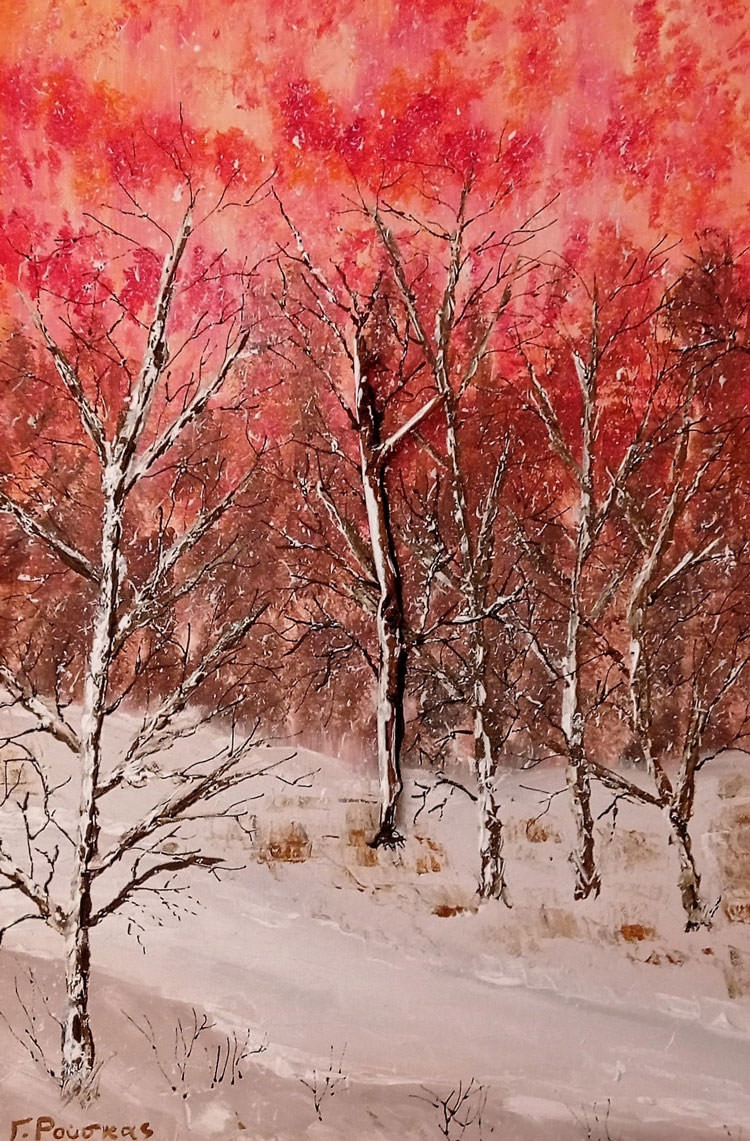
Look!
The almond trees will blossom soon
as others have blossomed, defying weather.
Eyes patient, closed, in hiding
will bloom amidst the cold.
By the grace of light.
Warm, wintry light.
Come.
See the colours that will clothe the desolation
steaming in the frost
breathe in the smell of coming waves of flowers
ah, how it mingles with the scent of rain
go out
place your hands upon the bare branches,
touch the trees’ swollen buds
caress the bulges on the trunk
imagine tiny calices
budding into flower
feel the multiplied gestation,
listen to the trees’ heartbeat
their lifeblood
running endlessly
behind a stationary image.
Come.
Let the light touch you.
It’s warm,
wintry light.
When
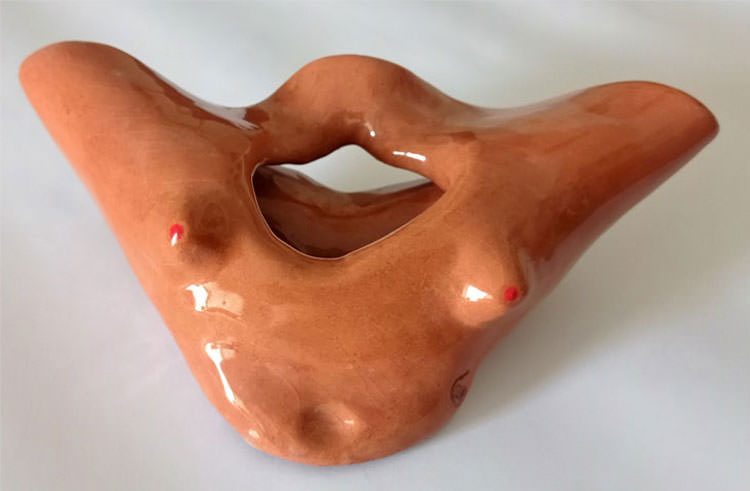
When I’m old
and it is time for me to leave my bed in the morning
no
I don’t want to find by my side
just any youthful body
that happened to spend the night with me
but
those eyes, untouched by time
those eyes I worshipped, the eyes I longed for and will always love
your eyes.
I want to hear that voice with the timeless hue
making my heart race now, as it did then
I want that same characteristic fragrance
before I touch the body that I long for
Want you to see in my eyes
before you hear good morning:
still, forever, the same
I love you as I did before!
“Like another Talos” collection
A night of May
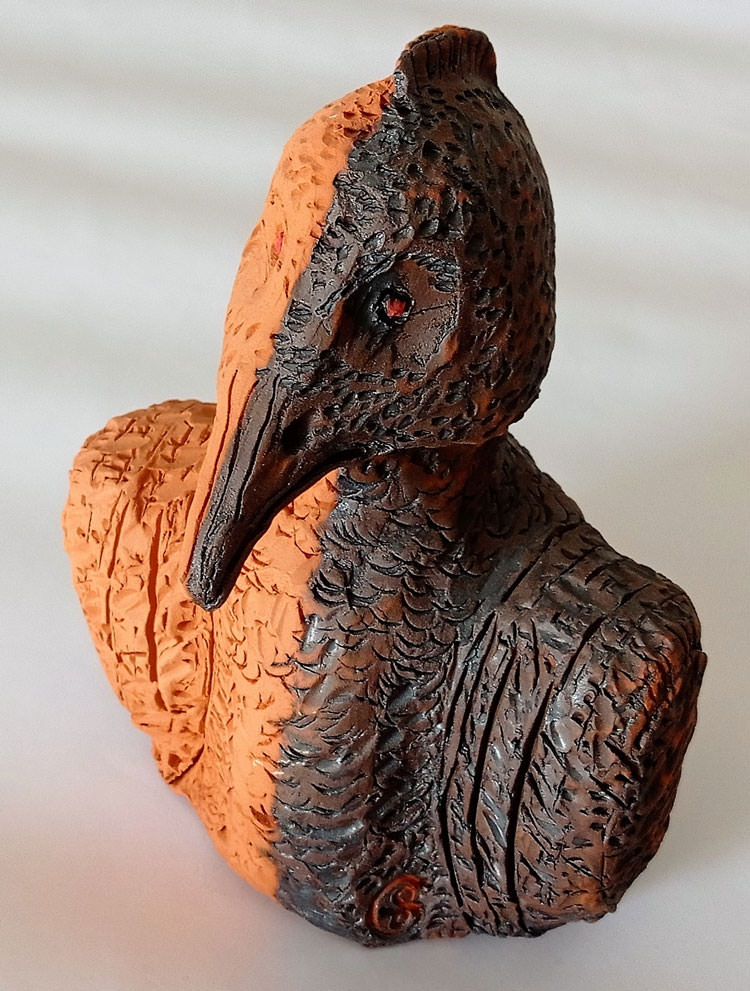
chords of breaths, rising and falling
from his flute, after the rain
raise a whirlwind of desires
scour the vineyards, searching everywhere for you
but find you locked a world away
from an open window
the ichor sylphs are letting in
a dream-woven bedsheet, folded in six
and leave it at your feet
paper like a white bedsheet
at the feet of love
inside it, only you will see
a blooming word
its writing’s code
if you unfold it
at a single nod from you
it will become a winged chariot
lead you to him
on this night of May
when, defenseless
you’ve been abandoned somewhere else
The dress
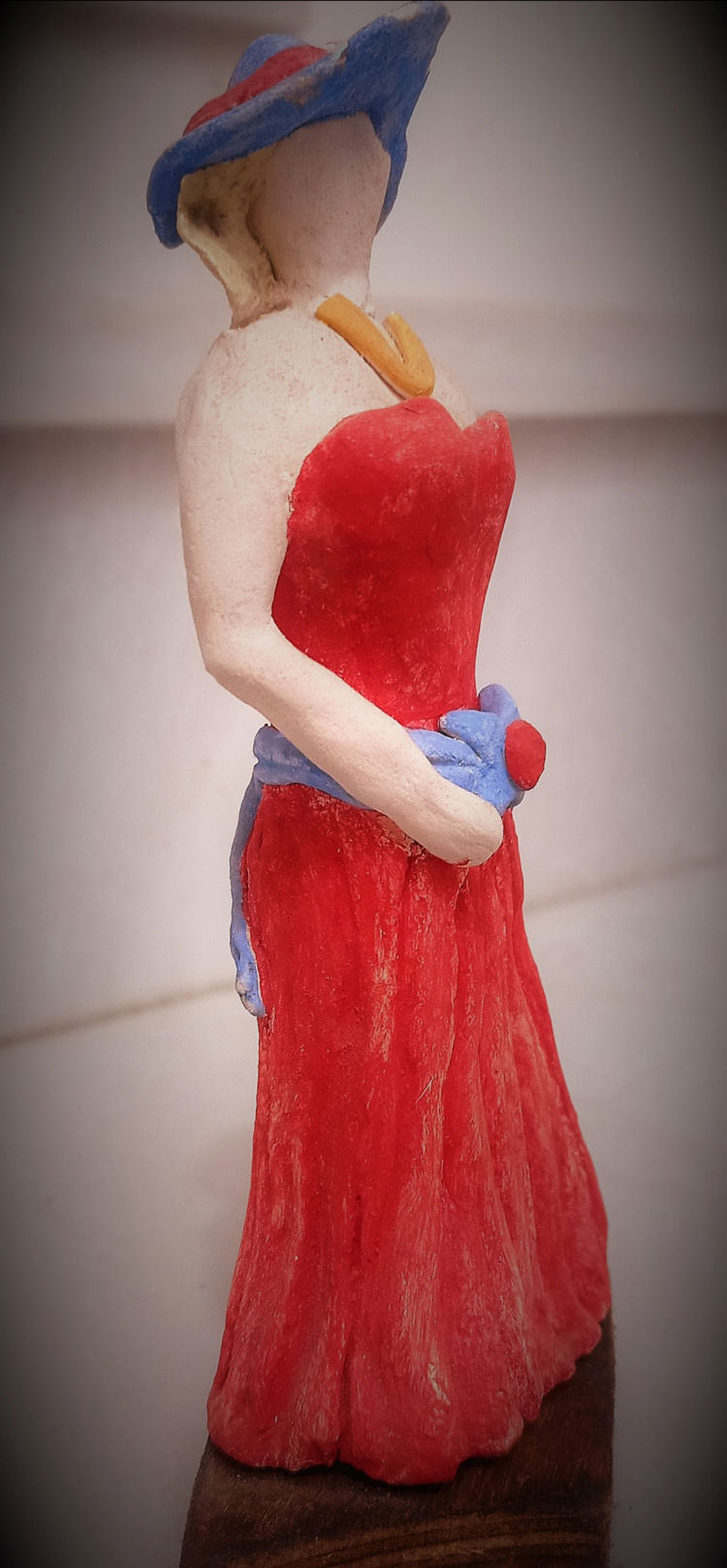
I’ll throw it away, you said
it’s gotten old
very well
but remember
when I first saw you, years ago,
wearing it at the bus stop
you were standing angry, nervous
wind was tugging at your dress
caressing your thighs
it may’ve become a little stretched
it may have even faded
but time’s decay is but a trifle
when the lines remain intact
and memories are safe inside
the fabric cover
of an intimate diary
with buttons down the side
imagine it was brought to life
from the designer’s drawing
to the tailor’s agony
from the pattern’s bed
to the scissors’ cutting
how many workers struggled
to feed their children
how they resisted the supervisor’s
nefarious suggestions
how many tons of thread were needed
the sewing-women working, bent
their swollen feet on the pedals
their eyes red from overtime
bundled cruelly in the storehouse
its passport, a delivery order
to end up in the shop’s black silence
and the customers’ white prattle
until you noticed it
you liked it
you tried it on and took it
it never betrayed you
drinking from your sweat
guarding your body
enfolding your form’s beauty
like a plaster cast
if you don’t want it any more
hold, do not throw it away
I will hang it
on top of my wedding suit
let the clothing become one
one
as our bodies were back then
Tide
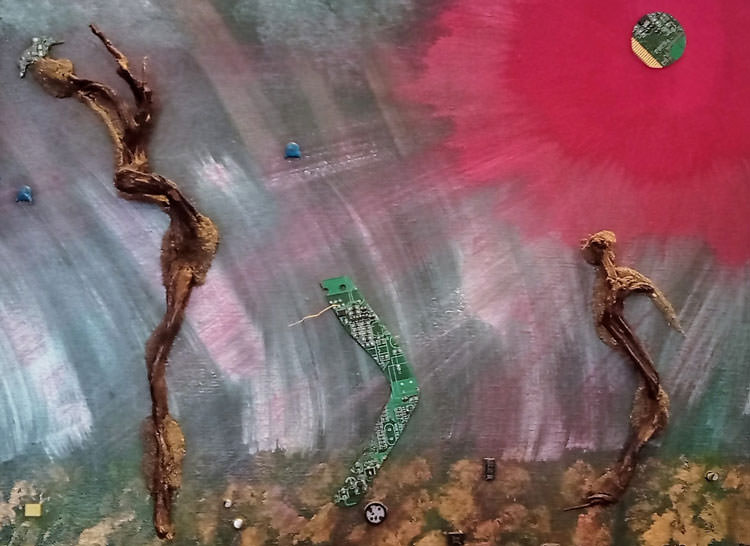
a tide of colours in the silence
colourful events, alternating
stars and galaxies
journeys through nocturnal fog
to cities under artificial lighting
mixtures, luminescence
memories, photosynthesis, experience
scaling currents of light
random forays into the past
the flavours of summer
and spreading smells of quietude
dreamlike harmony, in conjunction
with no need of a ticket
the moment the eyes shut




